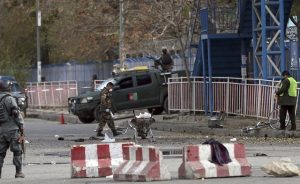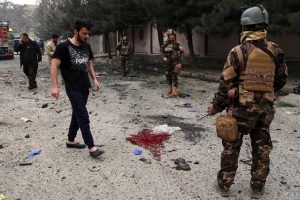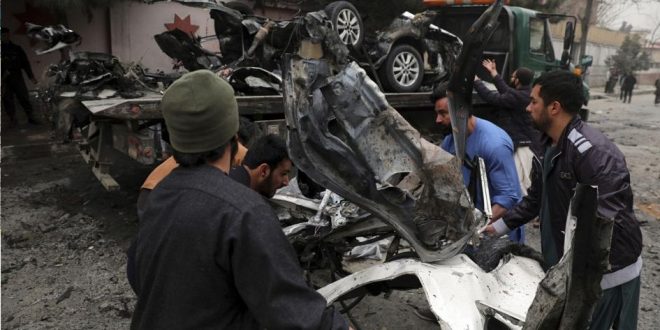20-02-2021
Bureau Report
 KABUL/ ISLAMABAD: Three sticky bomb attacks in the Afghan capital Kabul on Saturday killed at least five people and wounded dozens, a police official said, amid a surge in violence in the war-torn country.
KABUL/ ISLAMABAD: Three sticky bomb attacks in the Afghan capital Kabul on Saturday killed at least five people and wounded dozens, a police official said, amid a surge in violence in the war-torn country.
Kabul police spokesman Ferdaws Faramarz said two explosions caused by sticky bombs attached to vehicles took place 15 minutes apart and a third targeting a police vehicle exploded about two hours later.
No group immediately claimed responsibility.
The majority of bomb attacks in the capital Kabul in recent months have been sticky bombs explosive devices with magnets that are attached to vehicles and detonated by remote control or timer.
The second explosion targeted a car in a northwestern Kabul neighborhood in which national army soldiers were traveling, killing two soldiers. A civilian passerby was also killed.
 The third explosion destroyed a police car in western Kabul killing two police officers. Meanwhile, the first blast targeted a civilian car wounding both travelers inside the vehicle.
The third explosion destroyed a police car in western Kabul killing two police officers. Meanwhile, the first blast targeted a civilian car wounding both travelers inside the vehicle.
Kabul police said investigations were underway.
The Islamic State group’s local affiliate has claimed responsibility for some of the attacks, but many go unclaimed, with the government putting the blame on the Taliban. The insurgents have denied responsibility for most of the attacks.
Afghanistan has seen a nationwide spike in bombings, targeted killings and violence on the battlefield as peace negotiations in Qatar between the Taliban and the Afghan government have stalled. It’s been over a month since the sides last met to discuss how to proceed.
 Meanwhile, the new U.S. administration is reviewing the U.S.-Taliban peace deal signed Feb. 29 last year. A major part of the agreement was Washington’s commitment to a May 1 withdrawal of all foreign troops from Afghanistan.
Meanwhile, the new U.S. administration is reviewing the U.S.-Taliban peace deal signed Feb. 29 last year. A major part of the agreement was Washington’s commitment to a May 1 withdrawal of all foreign troops from Afghanistan.
Russia has stepped up efforts to try and find a way forward, visiting with regional players and officials and senior Taliban figures.
Zamir Kabulov, Russian President Vladimir Putin’s special envoy for Afghanistan, met with Pakistani officials, including army chief Gen. Qamar Javed Bajwa, on Friday to discuss the peace process. Pakistan is seen as a key player in the Afghanistan peace process since Taliban leadership maintains homes and headquarters in Pakistan.
 Pressmediaofindia
Pressmediaofindia




